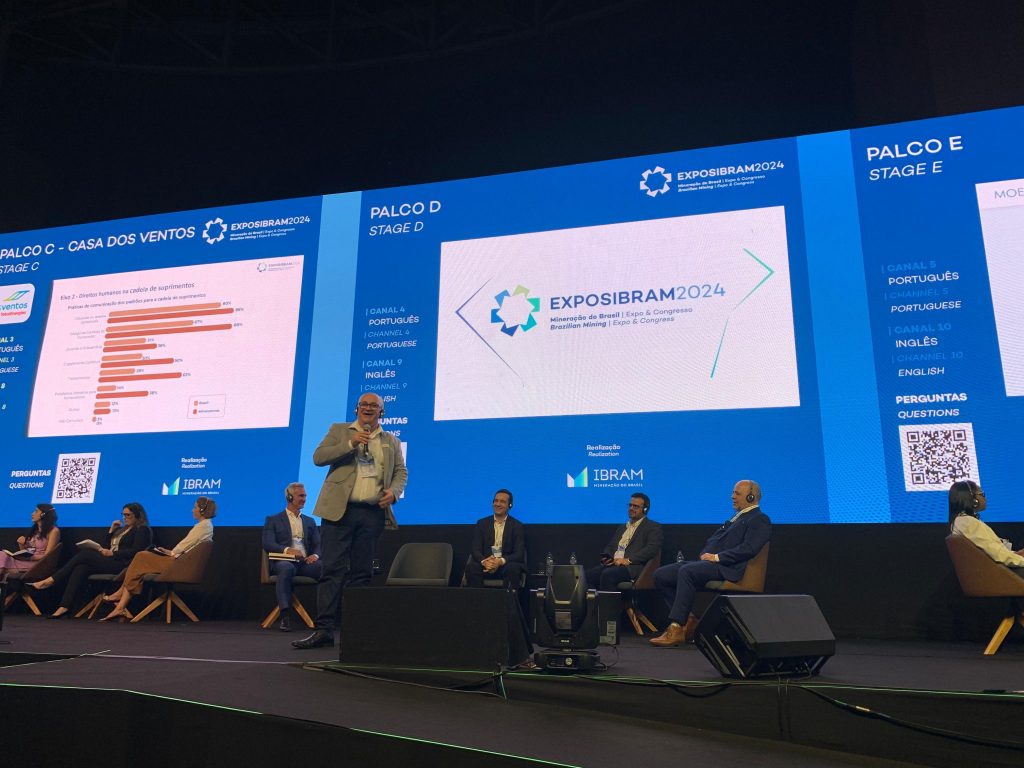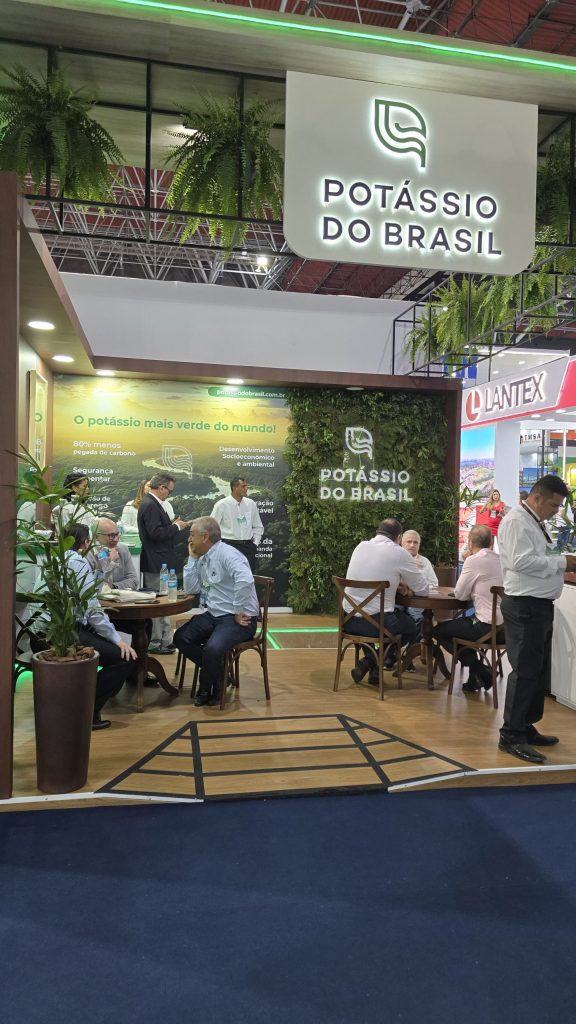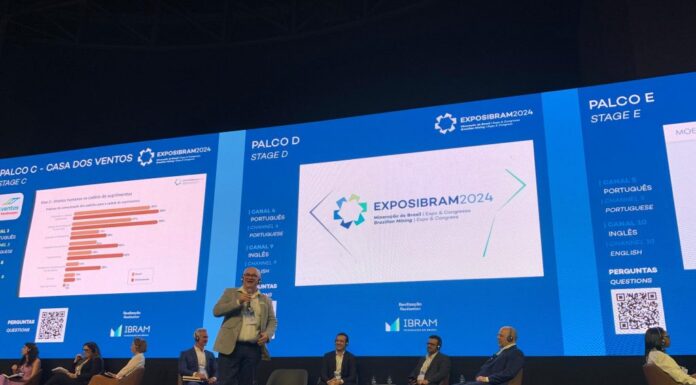
Brazil Potash presented its Autazes Potash Project at Exposibram 2024. Potássio do Brasil, the Brazilian subsidiary of Brazil Potash, showcased the project at this year’s event, which took place from September 9 to September 12 at the Expominas-BH Convention Center in Belo Horizonte, Minas Gerais. Exposibram, the largest mining exhibition and congress in Latin America, drew federal, state, and municipal authorities, as well as leaders from various sectors within the mining industry.
Adriano Espeschit, president of Potássio do Brasil, led a presentation on the Autazes Potash Project during the congress. His presentation included a video detailing the project’s scope and progress, particularly focusing on its environmental licensing history and the role it could play in bolstering Brazil’s agricultural capacity. The Autazes Project is situated in the city of Autazes, approximately 120 kilometers from Manaus, Amazonas. Espeschit noted that, since its preliminary environmental license in 2015, the project has achieved an installation license from the Amazonas Environmental Protection Institute (IPAAM), which now fully authorizes the construction phase.
Espeschit also emphasized the involvement of the local Mura people, a key indigenous community in the Autazes region. In September 2022, the Mura people voted with more than 90% approval to support the Autazes Potash Project, as part of a Protocol they organized. This community support was a pivotal moment, allowing the licensing process to proceed, according to Espeschit. “In September of last year, the Mura People decided by more than 90% of the votes to approve the Autazes Potash Project, according to a Protocol led by them, and from then on we advanced in the licensing process, receiving the installation license that guarantees the construction of the Project, which is now fully licensed,” Espeschit said.
Espeschit spoke on a panel titled “Advances and Trends in Environmental Licensing Legislation,” alongside other notable figures in the field. Panel members included Alexandre Oheb Sion from Sion Advogados, who moderated the discussion; Daniel Maciel, general legal manager of Mineração Rio do Norte; Werner Grau Neto from Pinheiro Neto Advogados; and Rodolpho Zahluth Bastos, Deputy Secretary of Environmental Management and Regularity at SEMAS-PA. The session explored the complexities and evolving landscape of environmental regulations for mining operations in Brazil.
The Autazes Potash Project is important for its mineral potential and its implications in Brazil’s agricultural sector. Potassium, a crucial mineral for fertilizers, is one of the main inputs required in agriculture, alongside nitrogen and phosphate. Brazil, as one of the world’s largest food producers, is heavily dependent on potassium for crop production, which supports food supplies for an estimated 1.6 billion people globally. Espeschit highlighted the strategic role of Brazil’s agricultural industry in feeding global populations and stressed the need for sustainable access to fertilizer components. “We probably have the second largest potassium evaporite basin in the world,” Espeschit said, underscoring the significance of the project.

The Potássio do Brasil booth also garnered considerable interest from attendees. Visitors could explore aspects of the Autazes region’s culture, with displays featuring artwork and artifacts by the Mura people. The Mura Indigenous Council (CIM), which represents indigenous villages in the region, contributed to the exhibit by providing handcrafted Mura headdresses, made by Lino Prado Mura, for display at the stand. In addition, Jeicy Mura, an artisan from the Mura community, designed shirts with Mura graphics, which were also on display.
Visitors also sampled cheeses produced in Autazes, showcasing another facet of the region’s cultural heritage. The display was part of Potássio do Brasil’s commitment as a “Citizen Company” to promoting the talents and traditions of the Mura community and fostering awareness of the local culture among a broader audience. Espeschit emphasized that Potássio do Brasil considers it essential to respect and integrate local cultural elements in all facets of its operations, from mining practices to community engagement.
The Autazes Potash Project has attracted attention due to Brazil’s current dependency on imported potassium, which accounts for approximately 98% of the country’s supply. As the world’s fourth-largest consumer of fertilizers, Brazil aims to decrease this reliance on imports by harnessing domestic resources through the Autazes Project. If successful, the project would allow Brazil to secure a more self-sufficient supply of this essential mineral, which is crucial for the continued growth of the nation’s agricultural sector.
Throughout the exhibition, Potássio do Brasil presented its approach to sustainable mining, emphasizing its commitment to minimizing environmental impact. Espeschit asserted that sustainable mining can be achieved “whether in the Amazon or in another biome.” He reiterated that responsible practices are integral to the Autazes Potash Project operations in the Amazon, highlighting that all phases of the project, from planning to construction, are subject to rigorous environmental standards.
As Brazil Potash moves forward with the Autazes Project, the company anticipates it will support Brazilian agriculture by reducing dependence on imported potassium fertilizers and helping to stabilize domestic fertilizer supplies. The project, if successful, could reshape Brazil’s position in the global fertilizer market and bolster the country’s agricultural productivity for years to come.
The above references an opinion and is for information purposes only. It is not intended to be investment advice. Seek a licensed professional for investment advice. The author is not an insider or shareholder of any of the companies mentioned above.
The post Brazil Potash Showcases Autazes Potash Project at Latin America’s Largest Mining Event, Exposibram 2024 appeared first on MiningFeeds.






